While the Western has been popular throughout the history of movies, it has decreased in prominence since the late 1970s.
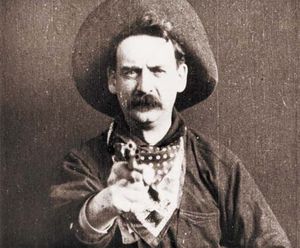 Justus D. Barnes, from
The Great Train Robbery
Justus D. Barnes, from
The Great Train Robbery
Contents |
Definition
Westerns, by definition, are set in the Western United States, generally between the 1860's and 1900, With some incorporating the Civil War.
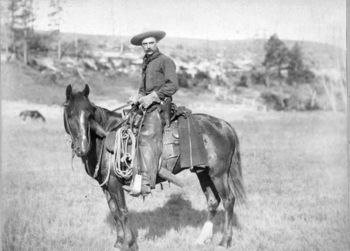 A cowboy, 1887
A cowboy, 1887
Westerns often involve semi-nomadic wanderers, often cowboys, whose sole possessions consisted of clothing, a revolver, and (optionally) a horse.
The technology of the era – such as the telegraph, printing press, and railroad – may appear, usually symbolizing the coming end of the frontier.
The Western takes these elements and uses them to tell simple morality tales, usually set against the spectacular scenery of the American West. Westerns often stress the harshness of the wilderness and frequently set the action in a desert-like landscape. Specific settings include lonely isolated forts, ranches, the isolated homestead, the saloon or the jail.
Other iconic elements in westerns include Stetsons and Spurs, Colt .45 revolvers, prostitutes and the faithful steed.
Common themes
The western film genre often portrays the conquest of the wilderness and the subordination of nature, in the name of civilization or the confiscation of the territorial rights of the original inhabitants of the frontier. The Western depicts a society organized around codes of honor, rather than the law, in which persons have no social order larger than their immediate peers, family, or perhaps themselves alone.
In the Western, these themes are forefronted, to the extent that the arrival of law and "civilization" is often portrayed as regrettable, if inevitable.
Western movies
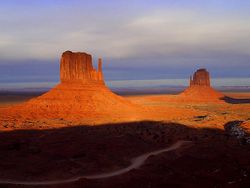 Monument Valley, Arizona, a common setting for
westerns
Monument Valley, Arizona, a common setting for
westerns
A genre in which description and dialogue are lean, and the landscape spectacular, is well suited to film. Early Westerns were mostly filmed in the studio like other early Hollywood movies, but when locations shooting became more common, producers of Westerns used desolate corners of California, Arizona, Utah, Nevada, Colorado or Wyoming, often making the landscape not just a vivid backdrop, but a character in the movie. Productions were also filmed on location at movie ranches.
The Western genre itself has sub-genres, such as the epic Western, the shoot 'em up, singing cowboy Westerns, and a few comedy Westerns. The Western re-invented itself in the revisionist Western.
Cowboys and Gunslingers play prominent roles in Western movies. Often fights with Indians are depicted, with "revisionist" Westerns give the natives sympathetic treatment. Other recurring themes of westerns include western treks, and groups of bandits terrorizing small towns such as in The Magnificent Seven.
The Classical Western film
The western film traces its roots back to 1903's The Great Train Robbery, a silent film directed by Edwin S. Porter and starring Broncho Billy Anderson. The film's popularity opened the door for Anderson to become the screen's first cowboy star, making several hundred Western movie shorts. So popular was the genre that he soon had competition in the form of William S. Hart.
In the United States, the western has had an extremely rich history that spans many genres (comedy, drama, tragedy, parody, musical, science fiction, etc.). The golden age of the western film is epitomised by the work of two directors: John Ford (who often used John Wayne for lead roles) and Howard Hawks.
Spaghetti Westerns
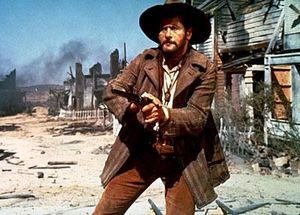 Eli Wallach in The Good, the Bad and the Ugly, a
Spaghetti Western
Eli Wallach in The Good, the Bad and the Ugly, a
Spaghetti Western
- Main article: Spaghetti Western
During the 1960s and 1970s, a revival of the Western emerged in Italy with the "Spaghetti Westerns" or "Italo-Westerns". Many of these films are low-budget affairs, shot in locations (for example: the Spanish desert region of Almería), chosen for cheapness and for similarity of landscape to those of the Southwestern United States. Spaghetti Westerns were characterised by the presence of more action and violence than the Hollywood westerns.
But the best of the genre, notably the films directed by Sergio Leone, have a parodic dimension (the strange opening scene of Once Upon a Time in the West being a reversal of Fred Zinnemann's High Noon opening scene) which gave them a different tone to the Hollywood westerns. Clint Eastwood became famous by starring in Spaghetti Westerns, although they were also to provide a showcase for other such considerable talents as Lee van Cleef, James Coburn, Terence Hill, Klaus Kinski, and Henry Fonda.
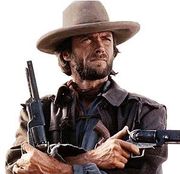 Clint Eastwood in a classic shot from The Outlaw
Josey Wales, a Revisionist Western.
Clint Eastwood in a classic shot from The Outlaw
Josey Wales, a Revisionist Western.
Revisionist Westerns
'Revisionist' is a term used in genre studies to describe films that change traditional elements of a genre.
After the early 1960s, many American filmmakers began to question and change many traditional elements of westerns. One major change was in the increasingly positive representation of Native Americans who had been treated as "savages" in early films. Audiences began to question the simple hero-versus-villain dualism and the morality of using violence to test one's character or to prove oneself right. Some recent Westerns give women more powerful roles.
Contemporary Westerns
Contemporary Westerns, as the name implies, are films that have contemporary American settings but nevertheless utilize Old West themes and motifs (a rebellious antihero, open plains and landscapes, climactic gunfights, etc.). For the most part, they still take place in the American West and reveal the progression of the Old West mentality into the late twentieth century. Examples include Sam Peckinpah's Bring Me the Head of Alfredo Garcia (1974), John Sayles' Lone Star (1996), Clint Eastwood's A Perfect World (1993), Tommy Lee Jones' The Three Burials of Melquiades Estrada (2005), Robert Rodríguez's Once Upon a Time In Mexico (2003)
Genre studies and Westerns
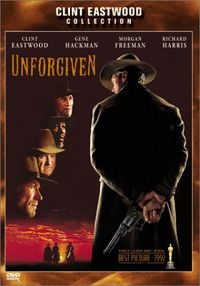 Clint Eastwood in a poster from Unforgiven
Clint Eastwood in a poster from Unforgiven
In the 1960s academic and critical attention to cinema as a legitimate art form emerged. With the increased attention, film theory was developed to attempt to understand the significance of film. From this environment emerged (in conjunction with the literary movement) an enclave of critical studies called genre studies. This was primarily a semantic and structuralist approach to understanding how similar films convey meaning. Long derided for its simplistic morality, the western film genre came to be seen instead as a series of conventions and codes that acted as a short-hand communication methods with the audience. For example, a white hat represents the good guy, a black hat represents the bad guy; two people facing each other on a deserted street leads to the expectation of a showdown; cattlemen are loners, townsfolk are family and community minded, e.t.c.. All western films can be read as a series of codes and the variations on those codes.
Since the 1970s, the western genre has been unraveled through a series of films that used the codes but primarily as a way of undermining them (Little Big Man and Maverick did this through comedy). Kevin Costner's Dances with Wolves actually resurrects all the original codes and conventions but "reverses the polarities" (the Native Americans are good, the U.S. Cavalry is bad). Clint Eastwood's Unforgiven uses every one of the original conventions, only reverses the outcomes (instead of dying bravely or stoically, characters whine, cry, and beg; instead of a good guy saving the day, irredeemable characters execute revenge; etc.).
One of the results of genre studies is that some have argued that "Westerns" need not take place in the American West or even in the 19th Century, as the codes can be found in other types of movies. For example, a very typical Western plot is that an eastern lawman heads west, where he matches wits and trades bullets with a gang of outlaws and thugs, and is aided by a local lawman who is well-meaning but largely ineffective until a critical moment when he redeems himself by saving the hero's life. This description can be used to describe any number of Westerns, as well as the action film Die Hard. Hud, starring Paul Newman, and Akira Kurosawa's Shichinin no samurai (The Seven Samurai), are other frequently cited examples of movies that don't take place in the American West but have many themes and characteristics common to Westerns. Likewise, it has been pointed out that films set in the old American West, may not necessarily be considered "Westerns."
Westerns in other Media
Westerns have branched out in other forms of media, most notably as either straight western stories, or western-horror hybrids, the latter of which have been done only a limited number of times on film, but much more in other media.
In comics, the western has been done straight, as in the classic comics of the lates forties and early fifties, featuring such revisionist (for the time) characters such as Pow-Wow Smith, and the more mainstream Hopalong Cassidy [1].
In modern times, the western comic has been done in a more Weird West fashion, usually involving supernatural horror, as can be seen in such comics as Jeff Mariottes's Desperadoes series, the one-off graphic novel, The Wicked West, or the more name-brand Jonah Hex from DC Comics.
In games the western has started to take a more modern root as well, shifting away from the simple make-believe and cap-guns of yesteryear and into the realms of modern video- and pen-and-paper games. These too are often done either straight, or mixed, using the western-horror motif.
One of the most famous examples of the pen-and-paper variety is the horror-hybird, Deadlands. Set in an alternate 1870's America, the game draws heavily on gothic horror conventions and old Native-American lore to derive its sense of the supernatural. Characters can get involved in situations ranging from banks heists to shoot-outs involving vampires and zombies over the course of their adventures.
Video games also use this same motif, one of the earliest horror-western games being Silverload for the PS1. The game has a variety of classic horror tropes in it, ranging from werewolves and vampires, to Satanic cults, that the player must contend with with nothing more than a trusty six-gun at his hip. In this same vein is the modern PS2/XBox first-person shooter, Darkwatch, in which the protagonist is himself a vampire, fighting through the west for either his own redemption, or furthering his own damnation.
A game which is a mix of straight western with a small amount of horror thrown in is the PS2 game, Red Dead Revolver from Capcom. It mostly follows a straight path, using many tropes made popular in the films of Sergio Leone for its basis, yet during a couple of levels throws in horror-related adjuncts, such as an evil carnival, or a ghost town where the bosses are implied to have either murdered the townsfolk, or to be dead themselves (such as a gunslinger who was hanged, but appears to fight once more, entering ghostly white and with the remnants of the noose still around his neck).
The classic computer game, The Oregon Trail is a western where in history is preserved as much as it can be for a medium in which interactivity is a requirement. In the game the character travels to California across the famous route that so many others took west, battling cold nights, dwindling supplies, and dysentery as opposed to the more fanciful vampires and undead ghouls of other games.
Another modern western game, Neversoft's GUN, also tries to tell a serious, straight western story. During the course of the game which contains a few Spaghetti-western tropes, the character engages in many historical missions, such as protecting Chinese rail-workers laying track, or joining with Clay Allison and his band of freedom fighters. Many minor details have even been included, such as sod homes and brass brothel tokens, all to add to the realism.
Influences on and of the Western
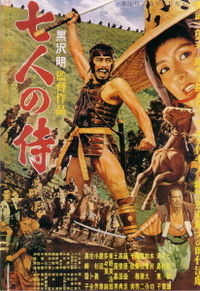 Movie poster for The Seven Samurai
Movie poster for The Seven Samurai
Many Westerns after 1960 were heavily influenced by the Japanese samurai films of Akira Kurosawa. For instance The Magnificent Seven was a remake of Kurosawa's Seven Samurai, and both A Fistful of Dollars and Last Man Standing were remakes of Kurosawa's Yojimbo, which itself was inspired by Red Harvest, an American detective novel by Dashiell Hammett. It should also be noted that Kurosawa himself was heavily influenced from American Westerns, especially the works of John Ford. Senses of Cinema
Despite the Cold War, the western was a strong influence on Eastern Bloc cinema, which had its own take on the genre, the so called 'Red Western' or Ostern. Generally these took two forms: either straight westerns shot in the Eastern Bloc, or action films involving the Russian Revolution and civil war and the Basmachi rebellion in which Turkic peoples play a similar role to Mexicans in traditional westerns.
An offshoot of the western genre is the "post-apocalyptic" western, in which a future society, struggling to rebuild after a major catastrophe, is portrayed in a manner very similar to the 19th century frontier. Examples include The Postman and the Mad Max series, and the computer game series Fallout.
Many elements of space travel series and films borrow extensively from the conventions of the western genre. Peter Hyams' Outland transferred the plot of High Noon to interstellar space. Gene Roddenberry, the creator of the Star Trek series, once described his vision for the show as "Wagon Train to the stars". More recently, the space opera series Firefly used an explicitly western theme for its portrayal of frontier worlds. Anime shows like Cowboy Bebop, Trigun and Outlaw Star have been similar mixes of science fiction and Western elements. The science fiction Western can be seen as a subgenre of either Westerns or science fiction.
Elements of western movies can be found also in some movies belonging essentially to other genres. For example, Kelly's Heroes is a war movie, but action and characters are western-like. The British film Zulu set during the Anglo-Zulu War has sometimes been compared to a Western, even though it is set in South Africa.
Stephen King's The Dark Tower is a series of seven books that meshes themes of westerns, high fantasy, science fiction and horror. The protagonist Roland Deschain is a gunslinger whose image and personality are largely inspired by the Man with No Name from Sergio Leone's films.
In addition, the superhero fantasy genre has been described as having been derived from the cowboy hero, only powered up to omnipotence in a primarily urban setting.
The western genre has been parodied on a number of occasions, famous examples being Support Your Local Sheriff, Cat Ballou, and Mel Brooks's Blazing Saddles.
George Lucas's Star Wars films use many elements of a western, and indeed, Lucas has said he intended for Star Wars to revitalize cinematic mythology, a part the western once held. The Jedi, who take their name from Jidaigeki, are modeled after samurai, showing the influence of Kurosawa. The character Han Solo dressed like an archetypal gunslinger, and the Mos Eisley Cantina is much like an old west saloon.
Notable Western movies
The "big three". Often considered the three best Westerns made:
The Good, the Bad and the Ugly
Once Upon a Time in the West
High Noon
Quote
- "As far as I'm concerned, Americans don't have any original art except Western movies and jazz."
- — Clint Eastwood, classic actor in Westerns
Gallery

Tex Ritter, a singing cowboy who sang the
theme from High Noon
|

Movie poster for The Magnificent Seven
|

John Wayne, actor in countless Westerns
|
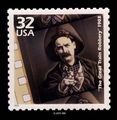
The Great Train Robbery, the first narrative
film produced in the United States, was a
Western
|
External links
- Yezbick, Daniel. The Western, St. James Encyclopedia of Pop Culture
- Top Fifty Westerns
- Golden Boot Awards
- Hall of Great Western Performers at the National Cowboy & Western Heritage Museum
- Steele Review
- The Western Writers of America website: http://www.westernwriters.org/
- Cowboy Pal
Categories: Film genres




 216.73.216.133
216.73.216.133 User Stats:
User Stats:
 Today: 0
Today: 0 Yesterday: 0
Yesterday: 0 This Month: 0
This Month: 0 This Year: 0
This Year: 0 Total Users: 117
Total Users: 117 New Members:
New Members:
 216.73.xxx.xxx
216.73.xxx.xxx
 Server Time:
Server Time: